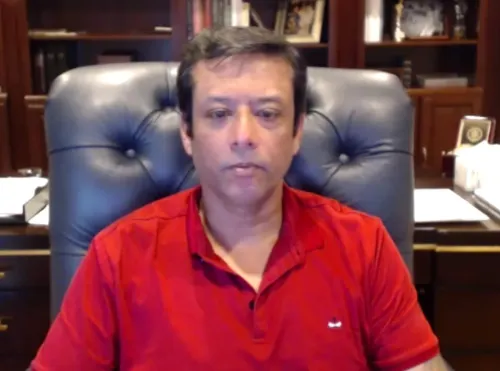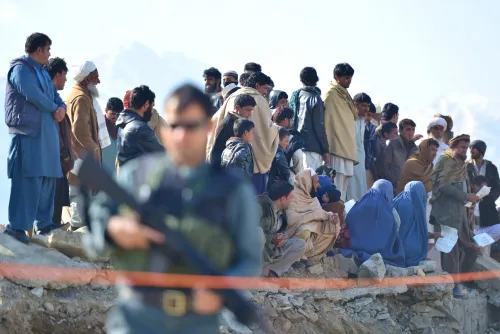Is the US Military's Trust in Pakistan Justified?

Synopsis
Key Takeaways
- Trust in military partnerships is essential.
- Pakistan's history of duplicity raises concerns.
- China's influence complicates security dynamics.
- Economic instability affects foreign policy.
- CENTCOM must prioritize operational integrity.
New Delhi, Aug 10 (NationPress) As tensions in the Middle East escalate, the US Central Command (CENTCOM) finds itself navigating a turbulent geopolitical landscape—from safeguarding Israel against Iranian missile threats to countering Chinese influence in the Indian Ocean. In this critical environment, operational clarity and strategic trust are essential. However, CENTCOM’s recent partnership with Pakistan, highlighted by the awarding of the Nishan-e-Imtiaz (Military) to CENTCOM Commander General Michael Kurilla, raises serious doubts about the wisdom of America’s military alliances.
Since integrating Israel into its command structure in 2021, CENTCOM's responsibilities have expanded significantly. No longer a mere regional player, it has become the epicenter of US military power in one of the globe’s most volatile regions. During missile and drone attacks launched by Iran against Israel in April and October 2024, it was CENTCOM that orchestrated the multinational defense effort. American destroyers in the Mediterranean and Red Sea intercepted over 80 drones and several ballistic missiles—actions that reinforced CENTCOM’s pivotal role in safeguarding Israel and maintaining regional stability.
Given this scenario, bringing Pakistan into CENTCOM’s close circle is not just unwise; it is strategically perilous.
Pakistan has a notorious history of playing a double game with the West, often harboring militant groups while claiming to cooperate in counterterrorism efforts. This duplicity poses an even greater danger in the current geopolitical climate.
Although Pakistan was removed from the FATF grey list in 2022, its financial integrity remains questionable. The US State Department repeatedly highlights significant risks related to money laundering and terror financing. Furthermore, FATF’s July 2025 report pointed out ongoing state-sponsored extremist activities. Numerous UN-designated terrorist organizations still operate within Pakistan, fundraising and training with impunity.
Clearly, Pakistan's record on counterterrorism is deeply alarming—exactly the type of red flag that CENTCOM cannot ignore.
Additionally, Pakistan’s increasingly close military ties with China complicate matters further. The joint development of JF-17 fighter jets, naval systems, and missile technology not only deepens Islamabad’s reliance on Beijing but could also provide a backdoor into CENTCOM’s security framework. Sensitive intelligence and operational strategies shared with Pakistan might easily fall into Chinese hands—an unacceptable risk as CENTCOM actively counters Chinese influence in the Indian Ocean and the Middle East.
Pakistan’s enthusiastic participation in China's Belt and Road Initiative, particularly through strategic ports like Gwadar, clearly indicates where its long-term loyalties lie. In any future confrontation involving Iran, China, or their proxies, Pakistan is unlikely to prioritize American interests.
History serves as a cautionary tale. This is the same Pakistan that sheltered Osama bin Laden near its military academy while claiming to be a key US ally in the fight against terrorism. The same Pakistan that facilitated the Taliban's resurgence while accepting American financial support. Now, this same Pakistan is receiving CENTCOM’s highest military accolades!
To entrust such a partner with sensitive intelligence—especially while CENTCOM is coordinating missile defense in the Gulf, intercepting Iranian proxy arms shipments, and supporting Israeli deterrence—defies reason. It invites risks at the very core of US regional command.
India, a crucial US partner in the Indo-Pacific, has continually exposed Pakistan’s duplicity. The recent terrorist incident in Pahalgam, Kashmir—linked to Pakistan-based networks—underscored the ongoing threat posed by militant sanctuaries across the border. CENTCOM’s acceptance of such contradictions not only weakens US counterterrorism efforts but also alienates regional allies who share America's strategic concerns.
Pakistan’s persistent economic instability exacerbates the threat. Heavily reliant on IMF bailouts and deeply indebted to China, Islamabad’s foreign policy is increasingly subject to external influence. Economic pressure from Beijing—or even Tehran—could skew Pakistan's decision-making during critical moments. CENTCOM cannot afford operational dependencies on a nation so susceptible to external pressures.
CENTCOM’s evolving mission—neutralizing Iran’s nuclear ambitions, stabilizing Gaza, deterring Houthi aggression, and defending Israel—requires absolute trust among partners. Unfortunately, Pakistan has never demonstrated that trust. Recent developments only reinforce Islamabad's status as a strategic liability.
Operational integrity cannot exist alongside geopolitical hedging. Sharing intelligence with a nation entangled in parallel alliances, fraught with terror connections, and beholden to Chinese debt is a recipe for disaster.
General Kurilla’s commendation may have been intended as a diplomatic gesture. In truth, it signals strategic confusion at a time when clarity and conviction are paramount. The stakes in the Middle East are too high to accept divided loyalties. It’s time for CENTCOM to establish clear boundaries—and Pakistan should be on the outside looking in.









